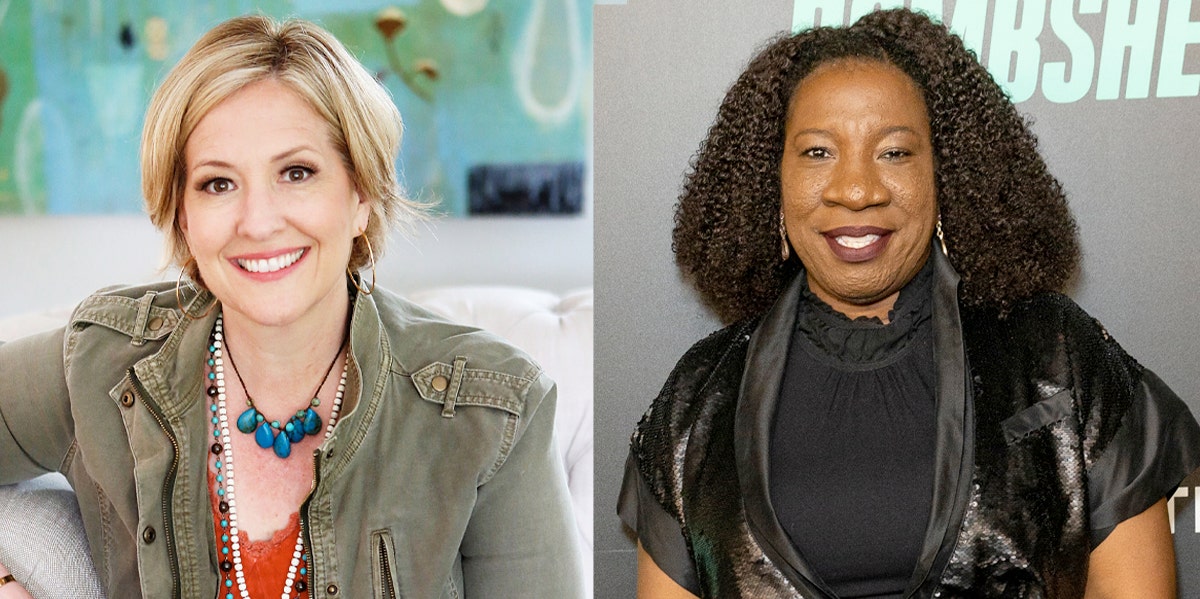Brené Brown & Tarana Burke Pair Up For New Book Boldly Exploring Vulnerability & Race
The essays explore how to take off the armor of trauma.
 lev radin / Shutterstock & Maile Wilson
lev radin / Shutterstock & Maile Wilson Two of the most influential women of the last decade, Tarana Burke and Brené Brown have a new book out — one they created together.
“You Are Your Best Thing” is a collaborative effort wherein the two serve as editors for an essay anthology that takes aim at vulnerability and shame in the Black community.
Burke says that the initial idea came from the fact that while she absolutely loved Brown’s work and the impact that it had on women and all populations, she felt that it sometimes didn’t translate well enough into her own experience as a Black woman.
Burke knew that it was time to change that. So she sent a message to Brown, and the two were quickly working together on a project that would become “You Are Your Best Thing: Vulnerability, Shame Resilience, and the Black Experience.”
What Burke and Brown have to tell us
Tarana Burke is the creator of the #metoo movement that saw the public push back against predatory men who abused and harassed women for far too long with no repercussions. It’s brought widespread attention to the unwanted advances and abuse that all women face at some point in their lives.
The #metoo movement brought accountability to some of the largest and most vile perpetrators like Harvey Weinstein and R. Kelly.
Burke began the story of #metoo way back in 2006, and now serves as the senior director at Girls For Gender Equity in Brooklyn, NY. She’s won multiple awards for her activism, including the 2019 Trailblazer Award.
Brené Brown is a multiple New York Times bestselling author, a professor of social work at the University of Houston, and public speaker. Her TED and TEDx talks have been viewed by millions of people all over the world, opening a new conversation about the benefits of vulnerability and courage.
Why vulnerability and shame resilience?
Brown has been working on publicizing the positive effects of opening oneself to vulnerability for the majority of her career. Shame resilience is an additional dimension in the equation that provides a person with the confidence to accept themselves and move in the world as an individual.
Burke’s original idea about translating Brown’s work allowed the pair to discover the unique challenges of Black trauma and how these principles could fit into improving the lives of those who needed it.
Trauma needn’t be an acute response to combat or a sudden accident, either. It can be the sustained existence within an environment that causes tremendous underlying stress. The Black experience in America is full of this particular form of trauma.
With police violence against Black people becoming a regular news category, more and more of us are finding out what Black Americans have known for hundreds of years. The system was never meant for them.
According to Brown, the timing was perfect.
She says she had “been grappling over the last couple of years with trying to figure out how to be more inclusive. The last thing I ever wanted to do was put work in the world around shame, vulnerability, and courage, and then make people feel like they had to do something extra to find themselves in it.”
Individual stories will help us take the armor off
Brown wants us all to “take the armor off.”
The main issue with Brown’s work is that we live in a country where Black Americans are taught through consistent demonstration that vulnerability is a liability. It’s a scary thing to accept vulnerability inside a world where that’s the oppressive nature of everyday reality.
White supremacy and its legacy, Brown points out, is itself an ongoing trauma.
Burke and Brown believe in the power of individual stories to tell us more about genuine lived experience. While we can all find out the broader picture through facts and figures, many everyday truths are hidden from us.
Empowering Black Americans to tell their stories of vulnerability and shame resilience can help other Black Americans find their own inner strength, and it can make us all more aware of the sinister traumas that America places on people by default.
Some of the essayists in the anthology are Black writers and artists such as Toyin Ojih Odutola, writer Tanya Denise Fields, disability rights activist Keah Brown, Black Therapists Rock founder Deran Young, and Kaiai Naadira, a non-binary activist who is also the daughter of Burke.
Each of these brilliant activists and creators have lessons from their own lives that reach into Brown’s work on vulnerability and pull out something heartfelt and courageous that translates into an aspect of Black America.
Black Americans have to be able to feel safe.
Incorporating the work of Brown into this niche is giving more people access to tools for self-improvement, by tailoring them specifically for their intersectional identities. Burke should be applauded for the idea, and we should encourage more thought leaders to work with individuals who want to translate their work for wider access.
As Burke says, “We have to be good stewards of this information.”
RELATED: How Adding Structure To Your Life Can Help Heal Trauma & Make You Feel Safe
Kevin Lankes, MFA, is an editor and author. His fiction and nonfiction have appeared in Here Comes Everyone, Pigeon Pages, Owl Hollow Press, The Huffington Post, The Riverdale Press, and more.
